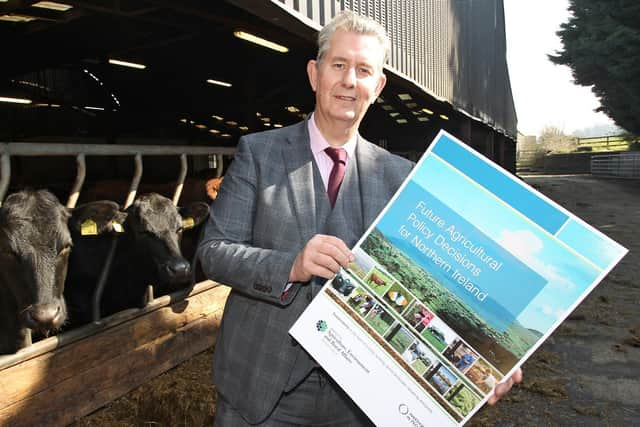Future Agricultural Policy decisions announced, including minimum claim size and beef sustainability package
and live on Freeview channel 276
Following his announcement, the Agriculture Minister Edwin Poots stated: “For the first time in 50 years we have been able to redefine how our agriculture sector operates and ensure a targeted delivery of programmes and funding that best meet all our needs.
“The future policy provides a fresh vision for a future agricultural regime that promotes productive, efficient practices through greater innovation and capacity, and increasing profitability whilst protecting the environment, animal health and welfare, and public health.
Advertisement
Advertisement
“We have developed a future agricultural policy that is based on four key outcomes of increased productivity, environmental sustainability, improved resilience and an effective functioning supply chain, alongside measured transition to new schemes.”


He continued: “On 21 December 2021, I launched a public consultation on my Future Agricultural Policy Proposals for Northern Ireland for a period of eight weeks.
“In total, 339 responses were received, with 30 from farming organisations and 11 from environmental organisations.
“Of the 284 responses received from individuals almost half identified as farmers.
Advertisement
Advertisement
“In reaching my decisions, views were considered from all sectors, age-groups, organisations and individuals.”
Decisions that are central to this future policy include:
*A Farm Sustainability Payment, which recognises the need for continuation of an income support ‘safety net’.
The payment will be area based, use entitlements and all land based agriculture and horticulture businesses which meet the eligibility conditions will be able to apply.
The minister said: “I have listened to the significant and numerous concerns raised by stakeholders on my proposals for a minimum claim size and I have decided to set that minimum claim size at 5 Ha.
Advertisement
Advertisement
“There will also be progressive capping of the Farm Sustainability Payment above £60,000 per farm business, in line with the consultation responses.”
*A Beef Sustainability Package with two parts - a Suckler Cow Measure and a Beef Carbon Reduction Measure.
Both of these measures are aimed at increasing productivity, making more efficient use of finite resources and driving down carbon emissions.
Work will be undertaken to explore options for support that will improve the overall performance and resilience of the sheep sector.
Advertisement
Advertisement
*A Farming with Nature Package developed through co-design with stakeholders in line with the principles stated in the consultation document.
The initial focus will be on actions to reverse the declining trends by creating and restoring habitats that are important for species diversity.
All land managers with 3 Ha or more of eligible agricultural land who meet the scheme requirements will be eligible to participate.
This includes land under conacre agreements and common land.
Advertisement
Advertisement
A cap on the level of payment available under the Farming with Nature Package will be applied.
*Farming for Carbon measures which encourage low carbon emission farming practices.
These will include; breeding cattle that are more environmentally efficient through the Ruminant Genetics Programme; the use of urease inhibitor fertilisers, the optimal timing of fertiliser and slurry applications and the establishment of grassland swards with legumes and herbs to reduce fertiliser nitrogen use; peatland rewetting and sustainable management under the umbrella of the Northern Ireland Peatland Strategy; biomethane and hydrogen production from agricultural waste will be developed through the Green Growth Strategy.
Mr Poots continued: “The policy decisions embrace other topics and areas of work including investment measures, knowledge transfer and innovation programmes, and the development of the Supply Chain measures.
Advertisement
Advertisement
“A Generational Renewal programme will encourage longer term planning for farm businesses; and DAERA will invest in the initiation of an industry led Ruminant Genetics Programme.
“The current Cross Compliance SMR/GAECs mechanism will be replaced with a simplified system of Farm Sustainability Standards.
“The horticulture policy proposals will be further developed through a pilot programmes in consultation with industry, focusing on the production of crops with good economic potential.
“All agricultural land is eligible for payment except for hard features (e.g. buildings, yards, laneways, etc.) under future area based schemes, and the department will revise its land eligibility documentation effective from 1 January 2024 to align with the introduction of new schemes.”
Advertisement
Advertisement
Mr Poots concluded: “It is my view that my policy decisions announced today are absolutely vital to support sustainable farming and rural communities.”
At this stage, no further proposals for support to incentivise productivity in breeding ewes are brought forward, however, work will be undertaken to explore options for support that will improve the overall performance and resilience of the sheep sector.
This will include work to explore how the sheep sector could be incentivised to provide baseline performance data to inform future sector support measures and to engage in a future Ruminant Genetics Programme.
The Future Agricultural Policy decisions are now available to view at: https://www.daera-ni.gov.uk/publications/future-agricultural-policy-decisions-northern-ireland